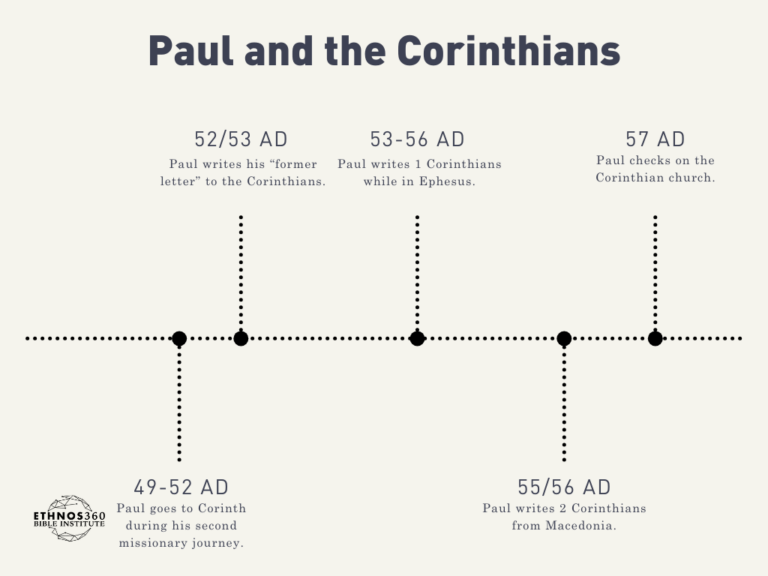
Corinthians Overview
Paul wrote at least three letters to the church in Corinth. Two of these letters ended up in our Bible. Although they were written to the Corinthian church, there’s great value to us studying them. One reason why is that the church in Corinth was a mess. They struggled with sexual immorality, idolatry, and disunity among other things. Because of this, we learn in Paul’s writings how to apply the gospel to everyday issues.

Timeline of Paul and the Corinthians
Literary Genre of 1 and 2 Corinthians
Epistle (a letter written to someone)
Date 1 and 2 Corinthians Were Written
53-56 AD
Author of 1 and 2 Corinthians
The author of these books is Paul, the apostle. You can read more about Paul’s background and life here.
1 and 2 Corinthians Audience
Corinth was a large city in Greece that had existed since 1200 BC. It was rich in history and wealth. At the time of these letters, Corinth was a Roman colony and the capital province of Achaia. The people there were very diverse. Because the city was on crossroads, it was an important commercial center, and pagan worship involving prostitution was thriving. It was here that Paul started a church on his second missionary journey. The letters are written to them, the Corinthian church.
Theme of 1 Corinthians
Unity in a Fragmenting Church
Key verse of 1 Corinthians
“I appeal to you, brothers and sisters, in the name of our Lord Jesus Christ, that all of you agree with one another in what you say and that there be no divisions among you, but that you be perfectly united in mind and thought.”
1 Corinthians 1:10
The Purpose of 1 Corinthians
Paul’s purpose for this letter was to deal with problems. He wrote 1 Corinthians in response to a letter he had received from them. That letter had carried bad reports about the church of Corinth. He responds to these issues in the letter. Through his responses, we see how the gospel applies to sin in everyday life. He also answered questions they had written to him about.
1 Corinthians Outline
- Introduction 1:1-9
- Things Paul had been told about the church 1:10-6:20
- Things the church had written to Paul about 7:1-16:12
- Conclusion 16:13-24
Theme of 2 Corinthians
Justification of Paul’s Apostolic Ministry
Key verse of 2 Corinthians
“It’s not that we’re competent in ourselves to claim anything as coming from ourselves, but our adequacy is from God.”
2 Corinthians 3:5
The Purpose of 2 Corinthians
2 Corinthians is a follow-up letter checking on how things are and preparing them for a visit. Paul had two main concerns regarding the Corinthian church. He wanted to be sure their gift for the suffering church in Jerusalem was ready. He also wanted to warn them about false prophets.
2 Corinthians Outline
- Paul’s Appeal through Comfort & Encouragement 1-7
- The Surprising Effect of Trials 1-3
- A Surprising Perspective on Trials 4-7
- Paul’s Appeal through Exhortation & Boasting 8-13
- Exhortation to Generous Giving 8-9
- Boasting in Trials & Weakness 10-13
Why You Should Study 1 and 2 Corinthians
Studying 1 Corinthians is helpful because it takes the gospel we know from books like Romans and applies it to messy real-life situations. The examples it uses are of people who are not living their faith out well. Studying this book helps us apply what we know to our current world and its problems.
Studying 2 Corinthians helps us do ministry. More specifically, it shows us how to do ministry from a grace perspective. It shows us how to be generous servants and allow the gospel to show through our weaknesses.
Interested in continuing to study God’s word?
The information in this post is from Ethnos360 Bible Institute’s courses on 1 and 2 Corinthians. Students take these classes as well as ones on all the other books of the Bible. They also take classes about missions and theology. Coming to Bible college is a great way to get a deeper understanding of the whole Bible in two years and be discipled. If this is something you’re interested in, you can request a free info packet below!
Content reworked from Dave Field’s Class on 1 Corinthians and Adam Hamill’s class on 2 Corinthians at Ethnos360 Bible Institute
Edited and formatted by Eliza Noel

